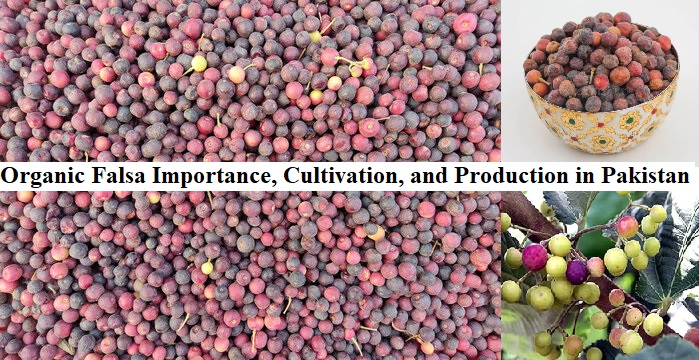Falsa, also known as Grewia asiatica or phalsa, is a sour, berry-like fruit native to South Asia. While falsa is naturally suited for organic cultivation, it is essential to verify the certification and labeling of commercial products to ensure they meet organic standards. Almost every age of People in Pakistan likes Falsa. In Summer season in Pakistan, people likes to consume Falsa juice. It is considered an organic and healthy fruit due to the following reasons:
-
Naturally Grown
Falsa is typically grown without the use of synthetic pesticides or fertilizers, making it an organic fruit. It is a hardy plant that can thrive in various climatic conditions, reducing the need for chemical interventions.
-
Nutritional Value
Falsa is a rich source of vitamins and minerals, including vitamin C, iron, and calcium. It also contains antioxidants and dietary fiber, making it a nutritious addition to the diet.
-
Traditional Cultivation
Falsa has been cultivated traditionally in South Asian regions for centuries, using sustainable and organic farming practices. Small-scale farmers often grow falsa trees without relying on chemical inputs.
-
Commercial Availability
Several online retailers and specialty stores offer organic falsa products, such as dried falsa berries, falsa juice, and even live falsa plants. These products are typically labeled as organic, ensuring they are grown without synthetic chemicals.
-
Culinary Uses
Organic falsa can be consumed fresh, dried, or used in various culinary preparations like chutneys, jams, and beverages. Its tangy flavor and nutritional profile make it a popular ingredient in traditional South Asian cuisine.
Falsa Production in Pakistan
Falsa production plays an important role in Pakistan’s agriculture, particularly in the Punjab region, and the fruit is highly valued for its culinary and nutritional properties. The southern areas of Punjab province are particularly well-suited for falsa cultivation. Falsa thrives in the challenging climate of Punjab, withstanding extreme heat and cold.
-
Growing Regions
Falsa is commercially cultivated in Pakistan, especially in the Punjab province and southern areas of Punjab. It is also grown in other regions like Sindh. It is commercially cultivated across districts in Punjab, with farmers producing 60-70 maunds (around 2.4-2.8 tons) of falsa per acre. Pattoki, a city in Punjab’s Kasur District, is specifically mentioned as a major falsa growing region. Punjab and Sindh have hot and dry climates during the summer months, which are favorable for falsa cultivation. Falsa is a hardy plant that can grow in various soil types, including sandy, loamy, and even saline soils, which are prevalent in these regions. Farmers in Punjab have experience and knowledge in falsa farming, including proper planting techniques, fertilizer application, and pest management.
-
Cultivation Practices
Falsa is typically propagated through seeds, but cuttings can also be used, with hardwood cuttings being preferred over softwood cuttings. It is a hardy plant that can grow in various soil types, including sandy, loamy, and even saline soils. Proper soil preparation, pit digging, and spacing (8 feet between plants and rows) are recommended for optimal growth.
-
Yield and Productivity
A single falsa tree can yield approximately 9-11 kg of fruit. The average yield per hectare is around 4.5-6 tons.
-
Pests and Diseases
Psylla is a major insect pest that affects falsa plants, particularly the leaves and new branches. Brown spot disease, which causes leaf senescence before maturation, is a significant issue from June to August. Proper sanitation by collecting and burning fallen leaves is recommended.
-
Harvesting and Marketing
Falsa fruits are harvested in multiple pickings on a daily basis during the fruiting season. The harvested fruits are sent to markets, where they are in high demand, especially during the summer months.
-
Versatility and Uses
Falsa fruits are consumed fresh, processed into juices, sherbets, squashes, and used in various culinary preparations like chutneys, jams, and desserts. The fruit is valued for its versatility and tangy-sweet flavor, making it a popular ingredient in Pakistani cuisine and beverages.














+ There are no comments
Add yours